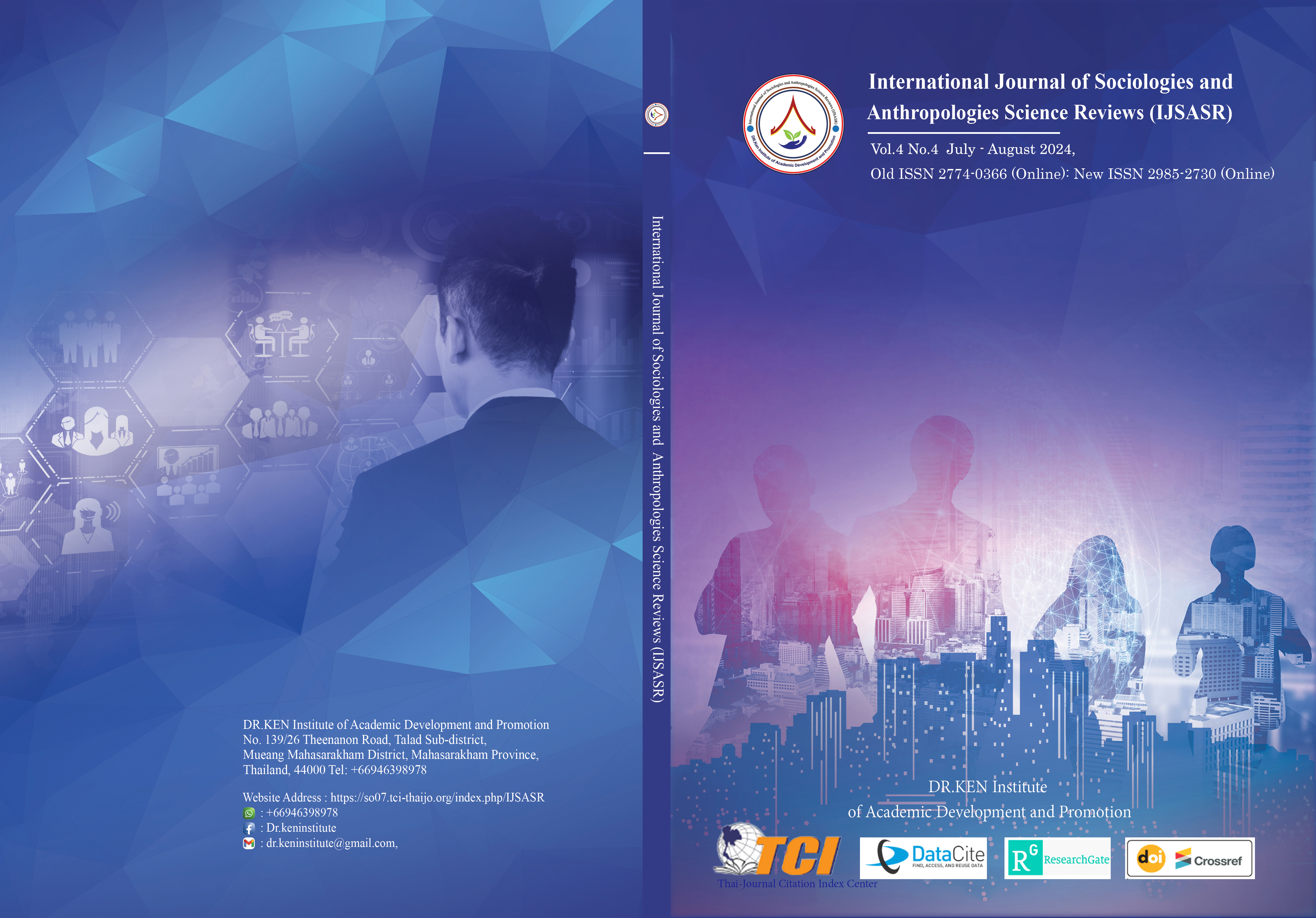Strategies for Enhancing the Leadership in Junior High School Teachers in Regional Schools of Chaozhou City, China
Main Article Content
Abstract
Background and Aim: The "teacher-school community" connected by "teacher+school" is an important issue that modern organizational behavior has long focused on, especially the strategy of enhancing teacher leadership in the teacher-school community, which has become a widespread focus in modern school development and reform. In 2018, the Central Committee of the Communist Party of China and the State Council jointly issued the "Opinions on Comprehensively Deepening the Reform of Teacher Team Construction in the New Era", which further strengthened the requirements for improving teacher leadership from a policy perspective, greatly highlighting the value and significance of exploring strategies for enhancing the leadership of junior high school teachers at the level of combining theory and practice.
Materials and Methods: Focusing on the strategy of enhancing the leadership of junior high school teachers, this study aims to solve the problem. Based on the systematic deconstruction and dimension division of the connotation of junior high school teacher leadership, a questionnaire survey is conducted to systematically investigate 1106 teachers of junior high schools in Chaozhou City, Guangdong Province, China. Using SPSS software to collect and analyze the data, a comprehensive investigation is also conducted on the problems in their leadership development, the causes of these problems, and targeted scientific strategies that align with the development needs of regional teacher leadership.
Results: The questionnaire survey shows that the leadership of middle school teachers in Chaozhou City is at a moderate level, and there is still a lot of room for improvement in each subdimension.
Conclusion: Researchers have proposed strategies for enhancing the leadership of junior high school teachers from five dimensions: professional leadership, cultural cultivation, organizational development, home-school cooperation, and social appeal.
Article Details

This work is licensed under a Creative Commons Attribution-NonCommercial-NoDerivatives 4.0 International License.
Copyright on any article in the International Journal of Sociologies and Anthropologies Science Reviews is retained by the author(s) under the under the Creative Commons Attribution-NonCommercial-NoDerivatives 4.0 International License. Permission to use text, content, images, etc. of publication. Any user to read, download, copy, distribute, print, search, or link to the full texts of articles, crawl them for indexing, pass them as data to software, or use them for any other lawful purpose. But do not use it for commercial use or with the intent to benefit any business.

References
Berg, J., Carver, C., & Mangin, M., (2014). Teacher Leader Model Standards: Implications for Preparation, Policy, and Practice. Journal of Research on Leadership Education, 9(2),195-217. DOI:10.1177/1942775113507714
Chai, C.Q. (2023). Network Organization and Dual Drive: Organizational Change Serving School Transformation. Primary and Secondary School Management, 4, 13-16.
Chen, G.H. (2023). Research on Optimizing the Path of Resource Allocation for Basic Education Teachers - From the Perspective of Intergovernmental Relations. Chinese Journal of Education. 1, 65-69
Childs-Bowen, D., Moller, G., & Scrivner, J. (2000). Principals: leaders of leaders. Nassp Bulletin, 84(616), 27-34.
Crowther, F., Kaagen, S.S., Ferguson, M., & Hann, L. (2002). Developing teacher leaders: How teacher leadership enhances school success. Thousand Oaks, CA: Corwin Press: xvii.
Frost, D., & Harris, A. (2003). Teacher Leadership: Towards a Research Agenda. Cambridge Journal of Education 33(3), 479-498. DOI:10.1080/0305764032000122078
Fullan, M. (2001). Leading in the Culture of Change. San Francisco: Jossey-Bass.
Gao, L., & Zhang, Z.J., (2022). Research on the evaluation index system of leadership for primary and secondary school teachers in China. Teaching and Management, 12, 22-26.
Grant, C., (2006). Emerging Voices on Teacher Leadership. Educational Management Administration & Leadership, 34(4), 511-532.
Harris, A., & Muijs, D. (2005). Improving schools through teacher leadership. Maidenhead: Open University Press: 43-45.
Hu, J.F., & Gu, L.X. (2012). A Survey and Study on the Current Situation and Influencing Factors of Teacher Leadership in China-Taking Guangdong Province as an Example. Curriculum, Textbooks, and Teaching Methods, 5, 111-116.
Jin, J.S. (2007). Research on Leadership of Primary and Secondary School Teachers. Doctoral Dissertation, Ph.D. Thesis. Northwest Normal University
Katzenmeyer, M., & Moller, G. (2001). Awakening the sleeping giant: Helping teachers develop as leaders. Thousand Oaks, CA: Crown Press.
Li, J., Yang, J.J., &Lai, M.Y. (2023) Teacher motivation, basic education development, and human capital accumulation: an empirical study based on the reform of the professional title system for primary and secondary school teachers. Economics (Quarterly), 23 (3), 1185-1201
Li, X.T. (2023) An Analysis of the Connotation and Development Strategies of Teacher Leadership. Educational Theory and Practice, 43 (2), 41-43
Li, X.Y. & Pei, M. (2017) Overview of research topics on foreign teacher leadership. Research on Teacher Development, 2, 105-114.
Reynolds, D. (1996). Turning around ineffective schools: Some evidence and some speculations. In J. Gray, D. Reynolds, C. Fitz-Gibbon, & D. Jesson (Eds.), Merging traditions: The future of research on school effectiveness and school improvement (pp. 150–162). London: Cassell.
Sun, J. (2021). 3D Model Design of Teacher Leadership: Conceptual Formation, Connotation Features, and Model Construction. Journal of Education, 6, 122-133.
Wang, Y.D. (2015). The impact of teacher human capital and social capital on student performance. Philosophy, Humanities and Social Sciences Edition: Xinjiang University.
Yang B.Y., Wang, N., & Zhang, Z. (2014) Analysis of the Theoretical Foundation of Collective Leadership. Journal of Management, 11 (10), 1428
Zeng, P.P. (2023). Combining knowledge and action to enhance the social and emotional abilities of rural teachers - Based on a large-scale survey of 11117 rural compulsory education teachers in Beijing. Primary and Secondary School Management, 7, 38-41.
Zhou, X.J., & Guo, N.S. (2014) Teacher Leadership. Beijing Normal Publishing House.
Zhou, Y.W., & Chen, G.M. (2021). "Teacher leadership" from an international perspective and its implications for the management reform of basic education schools. Journal. of Ningbo University of Education, 5, 123-136
Zhu, Y. (2022). The necessity and path of cultivating teachers’ leadership in the basic education stage under the background of the ‘Double Reduction Policy’ in China. Frontiers in Educational Research, 5(15), 23-28. https://doi.org/10.25236/FER.2022.051506.






